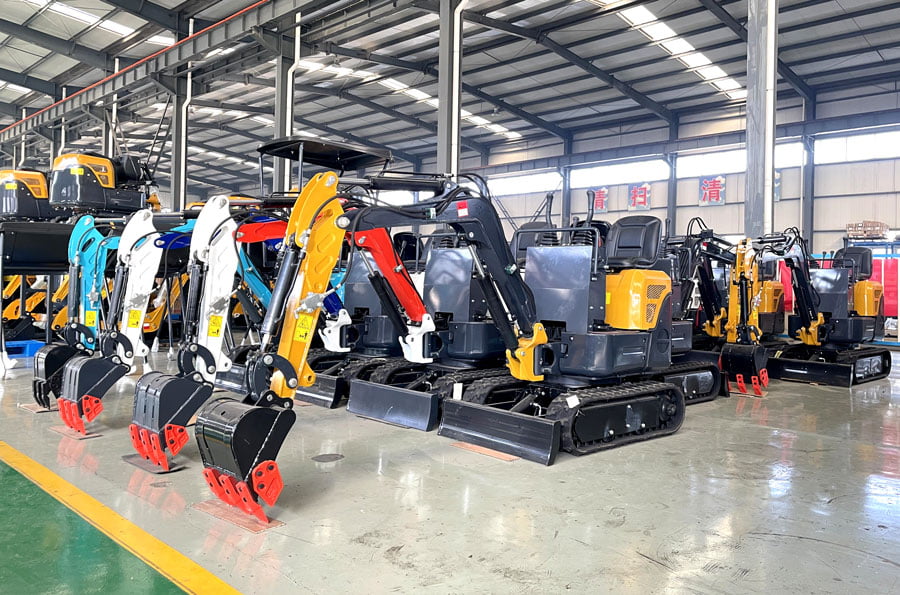Selamat datang di Blog Saya!
Saya senang sekali Anda ada di sini! Sebelum kita masuk ke dalam konten, saya ingin Anda bergabung dengan saya di platform media sosial saya. Di sanalah saya berbagi wawasan tambahan, berinteraksi dengan komunitas yang luar biasa, dan memberi Anda informasi terbaru. Inilah cara agar Anda bisa tetap terhubung:
📘 Facebook: Terhubung dengan saya di Facebook
🔗 LinkedIn: Ikuti saya di LinkedIn
▶️ YouTube: Saluran Produsen Traktor,Saluran Produsen Excavator
🎥 TikTok: Produsen Traktor,Produsen Excavator
Sekarang, mari kita mulai perjalanan ini bersama-sama! Saya harap Anda menemukan konten di sini yang penuh wawasan, menarik, dan yang paling penting, berharga. Mari jelajahi, pelajari, dan bertumbuh!
Daftar Isi
Pendahuluan
Purchasing construction equipment is never a small decision, and when you decide to buy ekskavator mini models without sufficient research, the consequences can be significant. These machines, though compact in size, represent a large investment and play a crucial role in project efficiency. Rushing into a purchase without evaluating critical factors may result in financial loss, decreased productivity, and long-term frustration.
This guide will uncover nine hidden risks associated with an uninformed decision to buy mini excavator equipment. We’ll explain what to look out for, how to mitigate potential problems, and what informed buyers do differently to make smart investments.
NO 1. Risk of Buying Undersized or Oversized Models
When individuals buy ekskavator mini equipment without proper evaluation, one of the first and most frequent errors is choosing the wrong machine size. A mini excavator that’s too small for the job will struggle to perform adequately. It may not have the necessary weight, reach, or breakout force to handle digging, lifting, or material movement effectively. This leads to delays, inefficiencies, and sometimes even a complete halt in work progress.
Conversely, an excavator that’s too large for the worksite may encounter access issues. Tight urban construction zones, landscaped properties, or indoor projects often demand a more compact machine. An oversized model might also increase fuel consumption and cause unnecessary wear on surrounding infrastructure due to its weight and turning radius.
Before you buy mini excavator models, thoroughly assess your operational needs. Evaluate the size of the working area, the type of soil or surface you’re dealing with, the depth and width of excavations, and how much lifting power is required. Consider also the access routes to your site. This detailed assessment helps you avoid mismatched sizing that can cost you more in both time and money.
NO 2. Lack of Understanding of Hydraulic Capacity


The hydraulic system is arguably the most crucial part of any ekskavator mini. It powers the arm, the bucket, and any attachments you might use. If you buy mini excavator options without examining the hydraulic specs, you may end up with a machine incapable of delivering the performance you need for your specific tasks.
Hydraulic flow rate (usually measured in gallons per minute or liters per minute) and pressure (measured in PSI or bar) determine how fast and how powerfully attachments operate. Whether you’re using a breaker, auger, grapple, or thumb attachment, these components depend entirely on the hydraulic system. Using incompatible attachments can lead to underperformance, frequent system stress, and even long-term damage.
Before purchasing, consult the machine’s hydraulic specs and match them to the job’s demands. If you’re uncertain about technical terms or compatibility, consult with an equipment expert or operator. Being informed at this stage helps avoid the costly mistake of buying a machine that needs expensive retrofits or suffers operational inefficiency from day one.
NO 3. Ignoring Maintenance History and Records
If you’re planning to buy mini excavator units from the used equipment market, one of the most vital steps you can’t skip is reviewing the maintenance history. Many used ekskavator mini might look pristine on the outside but harbor years of mechanical neglect.
A lack of maintenance records means you’re essentially guessing about the machine’s health. Has it had regular oil changes? Were the hydraulic filters and fluids changed on schedule? Has the undercarriage been inspected and serviced? These questions are critical. Machines without a documented service record could be hiding costly problems—like hydraulic leaks, worn cylinders, engine failures, or worn-out tracks—that may only surface once the excavator is put to work.
Always request detailed maintenance logs and ask specific questions about service intervals, major repairs, and component replacements. Also, have a qualified technician perform a pre-purchase inspection. A mini excavator with a complete and transparent maintenance record stands a much better chance of serving you well and saving you from unexpected repair bills.
NO 4. Unverified Seller Reputation and Machine Origin
The decision to buy ekskavator mini units from online listings or unknown resellers can pose a significant risk. The construction equipment resale market is often unregulated, and unfortunately, there are cases where buyers unknowingly purchase stolen or heavily modified machines.
When dealing with unknown sellers, you might be looking at excavators that have been assembled from mismatched parts, disguised with a paint job, or listed with false specifications. Even worse, if a machine turns out to be stolen and reported, you could lose your investment and face legal complications.
To safeguard your purchase, work only with reputable dealers or platforms that offer verification, documentation, and post-sale support. Always ask for original purchase receipts, registration details, serial number checks, and clear ownership history. Machines with legitimate origins typically include a service warranty or the option to return if issues arise.
Taking these steps not only gives peace of mind but also ensures you’re investing in a machine that’s safe, legal, and reliable.
NO 5. Overlooking Transportation and Storage Logistics


Another hidden challenge arises after the sale: getting your excavator from point A to point B—and having somewhere to store it. Many buyers buy mini excavator units without considering how to transport or store them, which can turn into logistical nightmares.
Ekskavator mini are compact, but they still require proper hauling solutions. Depending on the machine’s weight, you might need a heavy-duty trailer and a towing vehicle that meets legal transport regulations. Improper transport can damage the excavator or violate road safety laws, leading to fines or accidents.
Then there’s storage. Leaving your new machine exposed to the elements invites rust, corrosion, and theft. You’ll need a secure, preferably covered, area where the excavator can be parked when not in use. If you’re working across different sites, factor in time and cost for repeated transportation.
Plan ahead. Understand your region’s transport rules, and budget for storage solutions. These considerations are often overlooked but can have a significant impact on your project’s efficiency and your machine’s lifespan.
Mid-Article Table: Risk Overview
| Risk Factor | Consequence | Suggested Solution |
|---|---|---|
| Incorrect Size | Reduced productivity, costly downtime | Match size to project and site needs |
| Poor Hydraulic Compatibility | Tool limitations, low performance | Review flow rate and pressure specs |
| Lack of Maintenance Records | Hidden mechanical issues | Request full service documentation |
| Unknown Seller Background | Legal risk, poor product reliability | Choose reputable, verified sources |
| Ignored Storage Requirements | Damage, theft, extra costs | Plan logistics in advance |
| Missed Warranty Information | No protection against faults | Confirm and compare warranty terms |
| Incompatible Attachments | Limited functionality | Verify attachment compatibility |
| Neglecting Inspection | Overlooked defects, higher repair costs | Conduct professional pre-purchase check |
| Poor Resale Value Awareness | Financial loss at resale | Consider depreciation and market demand |
NO 6. Disregarding Warranty Coverage
Many buyers forget to check warranty details when they buy ekskavator mini units. Without warranty protection, any future repair becomes your responsibility. Mini excavators can face mechanical issues, and repairs are often expensive.
Before you buy mini excavator equipment, ask the seller about the warranty coverage. Know which parts are protected, how long the warranty lasts, and whether it covers labor costs. A strong warranty gives you peace of mind and protects your investment.
Never buy mini excavator models without confirming warranty terms—this small step can save thousands in future expenses.
NO 7. Incompatible Attachments and Accessories
Attachments make a mini excavator more useful, but not all tools fit all models. If you buy mini excavator machines without checking tool compatibility, you may face limitations on your job site.
When you buy mini excavator units, confirm that it supports the attachments you plan to use—buckets, augers, and hydraulic hammers should match the system. The wrong combination may damage the excavator or reduce performance.
Always check the specs before you buy ekskavator mini models to avoid wasting money on incompatible tools.
NO 8. Failure to Conduct Pre-Purchase Inspection

If you skip an inspection when you buy mini excavator machines, you risk buying damaged equipment. Cracks, oil leaks, or engine wear may not be obvious at first glance.
A pre-purchase inspection helps you avoid machines with hidden problems. When you buy mini excavator equipment—especially used—bring a mechanic or technician to check the unit.
Don’t buy mini excavator units blindly. A small inspection cost can protect your larger investment.
NO 9. Neglecting Future Resale Value
Many forget to consider resale value when they buy mini excavator equipment. Not all models hold their value well. Choosing the wrong brand or model can make it harder to sell later.
Before you buy ekskavator mini units, think long-term. Pick machines from trusted brands and check current market demand. Resale value matters, especially if you plan to upgrade in the future.
To protect your money, choose wisely when you buy mini excavator products.
Kesimpulan
Making the decision to buy ekskavator mini equipment should involve thorough research, critical evaluation, and trusted sources. Blind purchasing exposes you to mechanical risks, legal trouble, and financial pitfalls. By taking time to assess each factor outlined above, you’ll secure a machine that delivers on both performance and value.
Treat your equipment purchase like any long-term investment—do the homework, ask the right questions, and prioritize quality.
PERTANYAAN YANG SERING DIAJUKAN
Ukuran apa ekskavator mini should I buy?
Assess the type of work, space availability, and weight capacity before making a decision.
Is it better to buy ekskavator mini new or used?
Both have pros and cons. New offers warranties and condition assurance, while used can be cost-effective if well-maintained.
What features should I prioritize?
Hydraulic capacity, attachment compatibility, maintenance history, and operator comfort are key.
How do I avoid scams when I buy ekskavator mini?
Always verify the seller, check ownership documents, and get a professional inspection.
What’s the average lifespan of a mini excavator?
With proper care, a high-quality mini excavator can last 8,000 to 10,000 operational hours or more.




